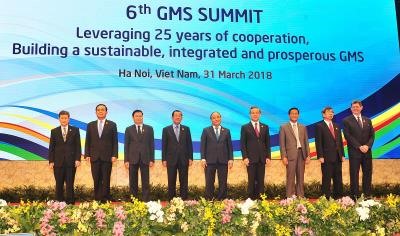 Politics & Law
Politics & Law

Leaders of the Greater Mekong countries have called for strengthening co-operation and connectivity in the sub-region and a commitment to stay open for regional and global trade.
 |
| Greater Mekong Subregion leaders take a group photo at the 6th GMS Summit in Hà Nội, on March 31, 2018. - VNA/VNS Photo |
HÀ NỘI — Leaders of the Greater Mekong countries have called for strengthening co-operation and connectivity in the sub-region and a commitment to stay open for regional and global trade.
At the plenary meeting of the 6th Greater Mekong Subregion (GMS) Summit in Hà Nội on Saturday, top officials of six GMS countries - Cambodia, China, Laos, Myanmar, Thailand, and Việt Nam - hailed the 2018-22 Hanoi Action Plan and the Regional Investment Framework, which were passed at the summit.
The two documents spell out the plans for investment of nearly US$66 billion in 227 projects in the sub-region over the next five years.
The amount is more than triple the total invested in the sub-region, $21 billion, in the last 25 years since the GMS was formed in 1992.
Hundreds of infrastructure works have been undertaken to physically connect the sub-region, including airports, bridges and over 10,000km of roads along with some 3,000km of power lines.
The GMS has also been the leading co-operative mechanism pioneering the development of three transnational economic corridors: East-West, North-South and Coastal South.
Prime Minister Nguyễn Xuân Phúc told the meeting: “The GMS used to [comprise] poor, underdeveloped and isolated countries in the last century. But now we are proud to have the fastest growing countries in the world, which are open and proactive to integration with big markets, and an ever-increasing middle class.
“The GMS is confident of continuing as the first ever co-operation mechanism that plays a key role in the Mekong River region for peace, sustainable development and prosperity for all.”
Thai Prime Minister Prayuth Chan-o-cha said while the development of hard infrastructure had seen fruitful outcomes in the last dozens of years, the GMS countries should focus in future on building soft infrastructure, for example by training human resources to a high standard, to catch up with the demands of the fourth industrial revolution and to participate in the global value chain.
“The GMS should also guarantee the free and safe movement of labour and experts within the region and protect natural resources and the environment, overcoming common challenges like climate change and creating eco-friendly economic potential.”
Investment shortage
Despite agreements to invest nearly $66 billion in the sub-region, regional leaders also raised concerns over a massive lack of funding for more than 200 projects in the next five years.
Asian Development Bank President Takehiko Nakao admitted it would be a challenge, saying there is a shortfall of at least $27 billion.
In other words, the countries, international development agencies and other donors would only be able to put up around 50 per cent of the funds needed.
He said the GMS must make efforts to mobilise resources from the private sector by approaching entities like the Mekong Business Initiative, e-commerce platforms and trade and financial conferences. — VNS
42584156PM.jpg) |
| Prime Minister Nguyễn Xuân Phúc delivers his speech at the plenary meeting of the 6th Greater Mekong Subregion Summit in Hà Nội, on March 31, 2018. - VNA/VNS Photo |




